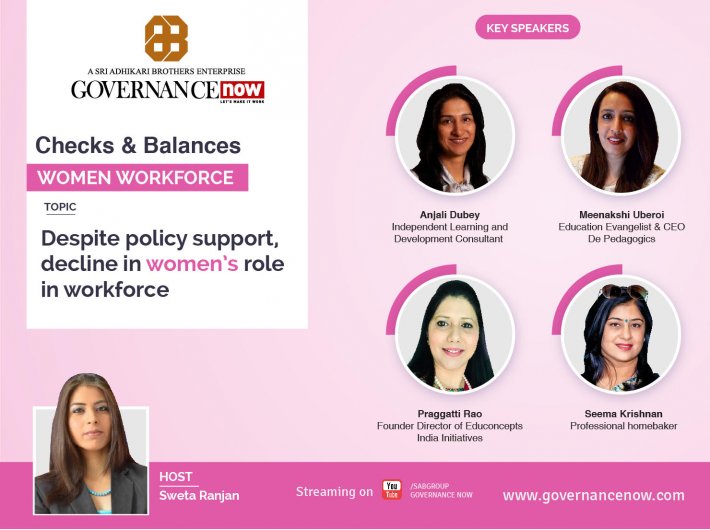In online governance debate forum CHECKS AND BALANCES, Sweta Ranjan discusses with experts how half of the population can contribute more for national growth
Michelle Obama once said, “No country can ever truly flourish if it stifles the potential of its women and deprives itself of the contributions of half of its citizens.” That should be so obvious, but it is not, and countries keep depriving themselves of the contributions of half of their populations.
In 2020, the share of women in the overall workforce fell to an all-time low of 18.6%, According to a recent international Deloitte survey report. The research estimates that almost 47% of women have suffered a job loss due to Covid-19, as the economic uncertainties and work conditions after the pandemic has worsened the situation.
India is no exception. The women workforce in India has dropped considerably over the past two decades. The proportion of women in employment in the country fell from 37 percent in 2006 to 18 percent in 2019, according to a 2020 report of Azad Foundation, an NGO.
The data clearly indicates that despite government efforts to introduce policies to empower women, the efforts are not bearing fruits. Contribution of women at the workplaces can certainly take the country higher on the growth curve. So what is stopping us from achieving gender equality in the economy? What more needs to be done?
The latest edition of ‘Checks and Balances’, an online discussion with experts on governance challenges hosted by Sweta Ranjan, raises some of these questions about the plummeting share of women in the workforce. Is this fight only about numbers or is there a role of biases and prejudices?
Watch the episode here: https://www.youtube.com/watch?v=1iR-0iuxsX0
Joining the discussion, Anjali Dubey, independent learning and development consultant who quit the corporate workforce after over 21 years to start her own journey in content creation, comments, “Juggling the work-life balance, more than what they were doing before, has led to a larger degree of women quitting their jobs.”
Meenakshi Uberoi, education evangelist and CEO of De Pedagogics, says, “Earlier, young women from small towns were moving to bigger towns for jobs, but as soon as the pandemic broke out, parents were the first to make a phone call to their daughters to return to home because of the sense of insecurity. There was a huge shift in which people went from bigger cities to back to their homes. Coming back is slower as there is a fear of re-establishing everything again.”
Praggatti Rao, an award-winning consultant psychologist, personal growth and transformation coach and founder-director of Educoncepts India Initiatives, brings the urban-rural divide in the debate, saying urban women were always a little less unfortunate than the rural women when it came to work. “There are many reasons, like rural women do not have financial stability and have no choice but urban women always had a choice.”
Rao stresses that the socio-cultural factors play a dominant role in influencing the participation of women in the labour force. She adds, “If we are making our girls educated but the family is not educated or does not evolve with time, then this will bring imbalance. Although the government has done a lot of work in this regard, we all know how things are different on paper from things that are there at the grassroots level. Whether it is education or violence against women or job opportunity, they are all inter-connected. It’s not a standalone, vacuum issue; it is a holistic thing. We need to look at it from various dimensions. When it comes to laying off of an employee, of course, there is more discrimination against women.”
Seema Krishnan, a professional home baker who quit her regular corporate job to follow her passion, says, “When it comes to a higher position in a corporate, there is a lot of politics and discrimination against women. Mostly at workplaces men are given preference for higher position. Even if a woman deserves, she is not given the opportunity".
Anjali Dubey says, “Maternity rules have changed. Progressive companies are very cautious, they provide all benefits and support but if a woman opts to go on a maternity break for six months, who will fill the gap? This kind of infrastructure in the organisations is lacking.”
Dubey praises the Tanishq jewellery heart-warming ad, ‘The Interview’, which presents motherhood as a boot camp. “The mindset has to change. If a woman returns after a break, do we value that experience? Are companies ready to provide mentorship and empathetic support to women returning to work after a gap?”
Pointing to the socio-cultural factors playing a dominant role in influencing the participation of women in the labour force, Meenakshi Uberoi says, “We need to bring in change by focusing more on gender parity rather than gender biasness.”
Dubey says, “It’s not that we don't have policies, schemes and laws. If we look at the National Policy for Empowerment of Women 2001, there are 21 schemes that are launched for women, ranging from education to loans, from creche to skill training. Things do exist but the problem is in execution and tracking. Why can't we have an audit for such policies?”


